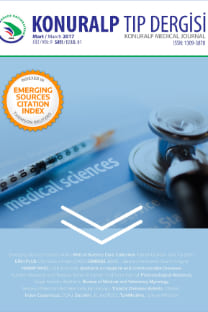Perkütan Koroner İşlem Yapılan Hastalarda Klopidogrel Direncinin Klinik Belirteçleri
clopidogrel resistance, coronary artery disease, hemoglobin
Clinical Markers of Clopidogrel Resistance in Percutaneous Coronary-Treated Patients
clopidogrel resistance, coronary artery disease, hemoglobin,
___
- KAYNAKLAR1. A randomised, blinded, trial of clopidogrel versus aspirin in patients at risk of ischaemic events (CAPRIE). CAPRIE Steering Committee. Lancet 1996;348:1329-39.
- 2. Steinhubl SR, Berger PB, Mann JT 3rd, Fry ET, DeLago A, Wilmer C, et al. Early and sustained dual oral antiplatelet therapy following percutaneous coronary intervention: a randomized controlled trial. CREDO Investigators. Clopidogrel for the Reduction of Events During Observation. JAMA 2002;288:2411-20.
- 3. Yusuf S, Zhao F, Mehta SR, Chrolavicius S, Tognoni G, Fox KK, et al. Effects of clopidogrel in addition to aspirin in patients with acute coronary syndromes without ST-segment elevation. Clopidogrel in Unstable Angina to Prevent Recurrent Events Trial Investigators. N Engl J Med 2001;345:494-502
- 4. Dupont AG, Gabriel DA, Cohen MG. Antiplatelet therapies and the role of antiplatelet resistance in acute coronary syndrome. Thromb Res 2009;124:6-13.
- 5. Gurbel PA, Bliden KP, Hiatt BL, O’Connor CM. Clopidogrel for coronary stenting: response variability, drug resistance, and the effect of pretreatment platelet reactivity. Circulation 2003;107:2908-13.
- 6. Patti G, Nusca A, Mangiacapra F, Gatto L, D’Ambrosio A, Di Sciascio G. Point-of-care measurement of clopidogrel responsiveness predicts clinical outcome in patients undergoingpercutaneous coronary intervention results of the ARMYDA-PRO (Antiplatelet therapy for Reduction of MYocardial Damage during Angioplasty-Platelet Reactivity Predicts Outcome study. J Am Coll Cardiol. 2008; 52: 1128-1133.
- 7. Jeong YH, Kim IS, Choi BR, Kwak CH, Hwang JY. The optimal threshold of high post-treatment platelet reactivity could be defined by a point-of-care VerifyNow P2Y12 assay. Eur Heart J. 2008; 29: 2186-2187.
- 8. Campo G, Fileti L, de Cesare N, Meliga E, Furgieri A, Russo F, Colangelo S, Brugaletta S, Ferrari R, Valgimigli M. Long-term clinical outcome based on aspirin and clopidogrel responsiveness status after elective percutaneous coronary intervention: a 3T/2r (Tailoring Treatment With Tirofiban inPatients Showing Resistance to Aspirin and/or Resistance to Clopidogrel) trial substudy. J Am Coll Cardiol. 2010;56:1447–1455.
- 9. Price MJ, Angiolillo DJ, Teirstein PS, Lillie E, Manoukian SV, Berger PB, Tanguay JF, Cannon CP, Topol EJ.Platelet reactivity and cardiovascular outcomes after percutaneous coronary intervention: a time-dependent analysis of the Gauging Responsiveness with a VerifyNow P2Y12 assay: Impact on Thrombosis and Safety (GRAVITAS) trial. Circulation. 2011 Sep 6;124(10):1132-37
- 10. Cuisset T, Frere C, Quilici J, Morange PE, Camoin L, Bali L, Lambert M, Juhan-Vague I, Alessi MC, Bonnet JL. Relationship between aspirin and clopidogrel responses in acute coronary syndrome and clinical predictors of non response. Thromb Res. 2009 Feb;123(4):597-603
- 11. Kim H, Lee HK, Han K, Jeon HK. Prevalence and Risk Factors for Aspirin and Clopidogrel Resistance in Patients with Coronary Artery Disease or Ischemic Cerebrovascular Disease. Ann Clin Lab Sci. 2009 Summer;39(3):289-94.
- 12. Fontana P, Berdagué P, Castelli C, Nolli S, Barazer I, Fabbro-Peray P, Schved JF, Bounameaux H, Mach F, DE Moerloose P, Reny JL. Clinical predictors of dual aspirin and clopidogrel poor responsiveness in stable cardiovascular patients from the ADRIE study. J Thromb Haemost. 2010 Dec;8(12):2614-2
- 13. Kakouros N, Kickler TS, Laws KM, Rade JJ. Hematocrit alters VerifyNow P2Y12 assay results independently of intrinsic platelet reactivity and clopidogrel responsiveness. J Thromb Haemost. 2013 Oct;11(10):1814-2
- 14. Price MJ, Berger PB, Teirstein PS, et al. Standard- vs high-dose clopidogrel based on platelet function testing after percutaneous coronary intervention: the GRAVITAS randomized trial. JAMA 2011; 305:1097.
- 15. Campo G, Fileti L, de Cesare N, et al. Long-term clinical outcome based on aspirin and clopidogrel responsiveness status after elective percutaneous coronary intervention: a 3T/2R (tailoring treatment with tirofiban in patients showing resistance to aspirin and/or resistance to clopidogrel) trial substudy. J Am Coll Cardiol 2010; 56:1447.
- 16. Cuisset T, Frere C, Quilici J, et al. Glycoprotein IIb/IIIa inhibitors improve outcome after coronary stenting in clopidogrel nonresponders: a prospective, randomized study. JACC Cardiovasc Interv 2008; 1:649
- 17. Trenk D, Stone GW, Gawaz M, et al. A randomized trial of prasugrel versus clopidogrel in patients with high platelet reactivity on clopidogrel after elective percutaneous coronary intervention with implantation of drug-eluting stents: results of the TRIGGER-PCI (Testing Platelet Reactivity In Patients Undergoing Elective Stent Placement on Clopidogrel to Guide Alternative Therapy With Prasugrel) study. J Am Coll Cardiol 2012; 59:2159.
- 18. Deharo P, Loosveld M, Bonnet G, Pankert M, Quilici J, Lambert M, et al. Impact of new P2Y12 blockers on platelet reactivity and clinical outcomes after acute coronary syndrome: Insight from a large single center registry. IJC Heart & Vessels, 2014; 4, 188–192
- 19. Aradi D, Tornyos A, Pintér T, Vorobcsuk A, Kónyi A, Faluközy J, Veress G, Magyari B, Horváth IG, Komócsi A. Optimizing P2Y12 receptor inhibition in patients with acute coronary syndrome on the basis of platelet function testing: impact of prasugrel and high-dose clopidogrel. J Am Coll Cardiol. 2014 Mar 25;63(11):1061-70
- ISSN: 1309-3878
- Yayın Aralığı: Yılda 3 Sayı
- Başlangıç: 2009
- Yayıncı: Düzce Üniversitesi Tıp Fakültesi Aile Hekimliği AD adına Yrd.Doç.Dr.Cemil Işık Sönmez
Türkiye’de Sağlık Okuryazarlığı Politikalarının Hastaneler Açısından Değerlendirilmesi
Kronik Spontan Ürtikerli Hastalarda Kronik Yaygın Ağrı Sıklığı ve Yaşam Kalitesi Üzerine Etkisi
Taner GÜNAY, Abdulkadir TURGUT, Oğuz Devrim YARDIMCI, Ergül DEMİRÇİVİ BOR, Gökhan GÖYNÜMER
Elif Deniz ŞAFAK, Hatice Duygu KIZILÇAY, Sibel ARGUVANLI, Mümtaz M. MAZICIOĞLU, Salime MUCUK, Ahmet ÖZTÜRK, Şemsinur GÖÇER, Yusuf KIRIS, Sibel AKIN
Obstruktif Uyku Apne Ön Tanısında Tiroid Fonksiyon Testlerinin Önemi ve Gerekliliği
Elif Deniz Şafak, Hatice Duygu Kızılçay, Sibel Arguvanlı, Mumtaz M. Mazıcıoğlu, Salime MUCUK, Ahmet ÖZTÜRK, Şemsinur GÖÇER, Yusuf KIRIŞ, Sibel AKIN
Zahide KOŞAN, Banu BEDİR, Sinan YILMAZ, Aysun ARAS, Elif OKŞAN ÇALIKOĞLU, Mahmut UÇAR
Kansere Yeni Yaklasim: Akciger Kanserinde İn Vitro Antianjiyogenik Tedavi
